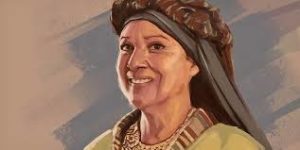Naomi
Her name means: “My Joy” or “Pleasant”
Her character: Suffering a threefold tragedy, Naomi refused to hide Her Sorrow or bitterness. Believing in Yehovah God’s sovereignty, she attributed her suffering to his will. But her fixation on circumstances, both past and present, led to hopelessness. A kind and loving mother-in-law, she inspired unusual love and loyalty in her daughters-in-law.
Her sorrow: To have lost a husband and two sons in a foreign land, far from family and friends.
Her joy: To have returned safely to Judea with her daughter-in-law Ruth, who would eventually rekindle her happiness and hope.
Key Scriptures: Ruth 1; 4:13-17
Her Story
She stood like an old tree twisted against the sky. Though Naomi could see for miles from her vantage point high on the road that led from Moab to Judah, she could glimpse nothing at all of her future. What more, she wondered, could possibly be taken from her? Her thoughts strayed to the past. Moses, she knew, had been buried somewhere in these mountains. But his people and hers had moved west into Canaan centuries earlier. Would she, too, be left behind, prevented from ever seeing her kinsfolk again? Was Yehovah God so displeased with her?
Ten years ago, she and her husband, Elimelekh, had lived happily in Judah. But the city whose name meant “house of bread” suddenly had none, so they had migrated to the highlands of Moab to escape the famine. Then Elimelekh had died and her sons had married Moabite women, whose race had descended from Abraham’s nephew, Lot. Plenty of women lost their husbands. Like them, she would find a way to survive. But then she had suffered the worst grief a mother could—outliving her own children.
Now Ruth and Orpah, her daughters-in-law, were the only kin she had in Moab. Loving them tenderly, she felt their widowhood as a double grief. Together they had cried and comforted each other. The three women finally decided to leave Moab for Judah. But once on the road, Naomi’s misgivings outran her craving for companionship. It wasn’t right for young women to forsake their families and friends for so uncertain a future. What chance would they, widows and strangers, have in Judah, even now that the famine had run its course? “Go back, each of you, to your mother’s home,” she told them. “May the Lord show kindness to you, as you have shown to your dead and to me. May the Lord grant that each of you will find rest in the home of another husband.” But Orpah and Ruth insisted, “We will go back with you to your people.” “Why would you come with me? Am I going to have any more sons, who could become your husbands? Return home, my daughters; I am too old to have another husband. Even if I thought there was still hope for me—even if I had a husband tonight and then gave birth to sons—would you wait until they grew up?”
The three women embraced, tears streaking their cheeks. Then Orpah kissed her mother-in-law good-bye. But Ruth clutched Naomi and whispered fiercely, “Where you go I will go, and where you stay I will stay. Your people will be my people and your God my God. Where you die I will die, and there I will be buried. May the LORD (YHVH) deal with me, be it ever so severely, if anything but death separates you and me.”
The old woman’s stubbornness was no match for the younger woman’s love. And so Naomi and Ruth continued on to Judah. After so long an absence, Naomi’s return created a great commotion in the town, and all the women welcomed her, saying, “Can this be Naomi?”
“Don’t call me Naomi,” she told them. “Call me Mara [meaning ‘bitter’], because the Almighty has made my life very bitter. I went away full, but the Lord has brought me back empty. The Lord has afflicted me; the Almighty has brought misfortune upon me.” Naomi could not see past her suffering. Like many of us, she may have felt as though her tragedies were punishment for her sins. Yet had she known the blessings in store, she might not have felt so hopeless. Instead, she may have compared herself to the tree that Job so graciously describes:
At least there is hope for a tree:
If it is cut down, it will sprout again,
and its new shoots will not fail.
Its roots may grow old in the ground
and its stump die in the soil,
yet at the scent of water it will bud
and put forth shoots like a plant. – Job 14:7-9
Her Promise
Yehovah God’s faithfulness to restore to fullness an empty life is revealed more in this story of Naomi than in any other biblical account. The famine and hunger that drove Naomi and her husband and sons away from Judah are finally replaced with full harvests and bread baked from grain gleaned in the fields. The anguish of losing her husband and sons is replaced with the loving care and concern of her daughter-in-law Ruth, who is “better to [Naomi] than seven sons” (Ruth 4:15). And Naomi’s empty mother-arms are filled with the son of Boaz and Ruth. She is no absent grandmother; the Scriptures say Naomi took Obed and “laid him in her lap and cared for him” (Ruth 4:16). (We’ll hear more about this grandson in the next chapter.)
Like Naomi, we may have trouble recognizing Yehovah God’s goodness and his faithfulness at times. But he is still with us no matter the circumstances.


0 Comments